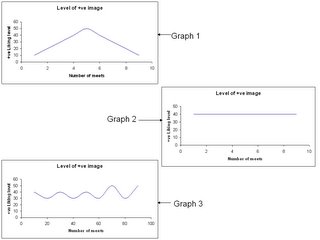
After finishing of with COLLATERAL LANGUAGE... i tried reading THE ART OF BEING by Erich Fromm.... too heavy stuff.. still i managed to turn around 20-30 pages which looked interesting..... but finally gave up as I felt I should start with something more easier to understand in psychology.... so got hold of THE SOCIAL ANIMAL by Elliot Aronson. The book is generally referred by undergraduate students of psychology but after reading a bit I felt that the writer has done a brilliant job of communicating his ideas in most simple and effetive way through the use of various examples which one can easily decipher.
Rather than starting of from beginning I preferred this time to read the chapter which looked very interesting.... ATTRACTION: Why People Like Each Other.......
The author gives various aspects of liking others. We like people whose behavior provides us with maximum reward at minimum cost. But it cannot explain all. Disagreement that leads to improvement may carry its own rewards. Flattery will get you somewhere to some extend in being liked but not far. We like people who contribute to our victory more than those who do not- even if they had no intention of doing us a favor.
We like to be liked- and the more insecure we feel, the more we like someone who likes us. A person who feels insecure may even seek out a less attractive person in order to diminish the possibility of being rejected.
Our being liked by a person increases the likelihood we will like him or her.
Strange fact:
Similarity of thoughts and being liked are not additive. Experiments show that although it is nice to be liked by someone who shares our values and opinions, it is far more exciting to be liked by someone who dosen’t. This happens because we infer there must be something special and unique about us that the other person finds attractive. People tend to suspect that, where opinions differ, "That person likes me for myself---not for my opinions." Because this realization is quite gratifying, we tend to like the individual more.
Increases in positive, rewarding behavior from another person have more impact on an individual than constant, invariant reward from that person.
My thoughts:
A hypothetical scenario, what if the +ve first increases then decreases(--graph1 in pic below)…. u get into more closely when the positive increases… but gradually figure out that now its turning into downhill which never seems to go up again…??

A relationship in which close friends are the ones least likely to provide us with gains in esteem is almost certain to be a relationship in which the partner are not open and honest with each other. In a closed relationship, people tend to suppress their annoyances and keep their negative feelings to themselves. This results in a fragile plateau that appears stable and positive but that can be devastated by sudden shift in sentiment. In an open, honest, authentic relationship, one in which people are able to share their true feelings and impressions (even their negative ones) -- graph 3--, no such plateau is reached. Rather there is continuous zigzagging of sentiment around the point of relatively high esteem.
We like a person better after we have disclosed something important about ourselves. We also like a person better when they honor us by revealing something intimate and negative about themselves; this is specially true when the person is ordinarily reserved and, therefore, the behavior implies that there is something special about us that made him/her like opening up.
First impressions are important, relationships must begin before they can develop and mature. But as the relationship ripens towards greater intimacy, what becomes increasingly important is authenticity- our ability to give up trying to make a good impression and begin to reveal things about ourselves that are honest even if unsavory. We must be willing to communicate a wide range of feelings to our friends under appropriate circumstances and in ways that reflect our caring.
My thoughts----- As religions across the world are different and there are different beliefs of various cultures, depending on the culture we are brought up shapes our thinking and is predominantly shown in our behavior with others. Does research carried out in one part of the world apply universally to every other geographic location?? I doubt this…. Though I guess most of the findings may still be valid but some might vary.....
Would update more as I read further......:)
No comments:
Post a Comment